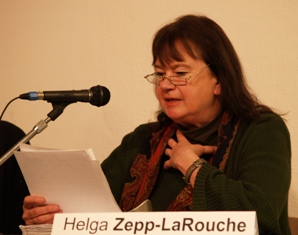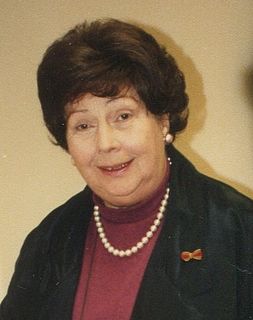
Elke Sommer is a German actress, model, singer, painter, and entertainer. She appeared in numerous films in her heyday throughout the 1960s and 1970s, including roles in The Pink Panther sequel A Shot in the Dark (1964), the Bob Hope comedy Boy, Did I Get a Wrong Number! (1966), Agatha Christie's And Then There Were None (1974), and the British Carry On series in Carry On Behind (1975).

Bürgerrechtsbewegung Solidarität (BüSo), or the Civil Rights Movement Solidarity, is a German political party founded by Helga Zepp-LaRouche, the widow of U.S. political activist Lyndon LaRouche.

Jutta Speidel is a German actress.
Helga Anders was an Austrian actress.

Helga Feddersen was a German actress, comedian, singer, author, and theater director.

Marianne Koch is a German actress of the 1950s and 1960s, best known for her appearances in Spaghetti Westerns and adventure films of the 1960s. She later worked as a television host and as a physician.
Helga Schubert is a German psychologist and author.

Helga Vlahović was a Croatian journalist, producer, and television personality, whose career spanned five decades in both SFR Yugoslavia and later Croatia. She was one of the most popular television presenters in the 1980s. Throughout her career, she was also credited as Helga Vlahović Pea and Helga Vlahović Brnobić during the times she was married.
Helga Guitton is a German radio and television presenter. She was a disc jockey and interviewer for RTL and was presenter of the 1973 Eurovision Song Contest.

The Heinrich Greif Prize was an East German state award bestowed on individuals for contribution to the state's cinema and television industry.
Meister Eder und sein Pumuckl is a West German-Austrian-Hungarian children's series. It is based on the character Pumuckl, created by children's book author Ellis Kaut.

Helga – Vom Werden des menschlichen Lebens is a 1967 West German sex education documentary and the first film of the Helga trilogy, starring Ruth Gassmann as Helga. Its release in West Germany was followed by international releases to many European countries, the British Commonwealth and the United States. It became one of the greatest box-office successes of West German cinema, viewed by forty million people in West Germany and internationally. In the first months of its showing in West Germany the audience had reached four million people. The film featured scenes of childbirth which were the first to be shown publicly in Germany. Helga was the first in a series of educational films which were considered "relatively permissive" at the time. The film was considered a part of an "enlightenment wave" which was undertaken by the West German Federal government at the time. In 1968, in France, the film was viewed by five million people. In Grenoble alone it is reported that 60,000 viewers had seen it in the first days of its screening, out of a population of 150,000. In Tours, the film played to full-houses for three consecutive weeks. The film used animation, stock footage and microphotography to depict the stages of life from conception to childbirth.

Helga Diercks-Norden was a German journalist and feminist activist. Later she moved into politics (CDU), serving briefly as a member of the Hamburg Parliament during 1977-78.
Helga Magdalena Timm was a German politician.
Fritz Hollenbeck was a German actor, primarily of television. His best known work is the title role in the television series Uncle Bräsig between 1978 and 1980. He married the actress Rotraud Conrad.
Helga Neuner is a German actress.

Helga "Big Helga" Hahnemann was an East German multi-faceted stage performer and entertainer. She came to wider prominence through her television and radio appearances after 1962. By the time reunification arrived in 1990 she had become a leading star of the small screen in East Germany. She fell terminally ill and then died shortly afterwards, possibly because of the extent of her addiction to cigarettes: she was 54. Her death left unanswered the question of how successfully her performances might have captivated pan-German television audiences post unification.

Helga Schuchardt is a German politician and engineer.
Klaus Storck was a German cellist who appeared internationally as soloist and chamber musician. He also edited music for cello. He often appeared in a duo with his wife, the harpist Helga Storck, and composers wrote music for them.
This page is based on this
Wikipedia article Text is available under the
CC BY-SA 4.0 license; additional terms may apply.
Images, videos and audio are available under their respective licenses.










